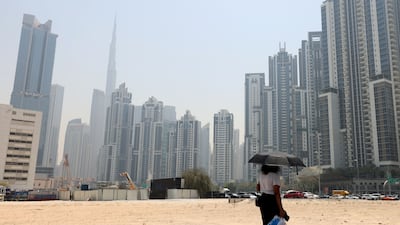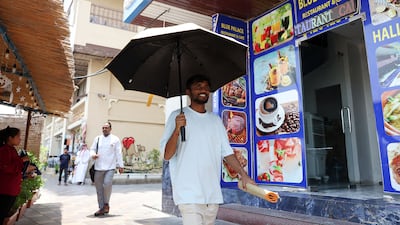Doctors have advised UAE residents and visitors to take care outside as temperatures soar.
The mercury has repeatedly climbed above 50°C in recent days with the National Centre of Meteorology reporting on Friday that temperatures hit 51.8°C in Abu Dhabi’s Sweihan area – just shy of the 52°C record in 2010.
Doctors told The National on Sunday that people needed to stay inside if possible during the peak heat hours between midday and 4pm, avoid strenuous activity during this time and stay hydrated.
“There has been an increase in heat-related complaints such as heat exhaustion, dehydration and dizziness, especially among outdoor workers and the elderly,” said Dr Yasir Shafi of Wellth, a clinic in Dubai that offers non-invasive treatments and is run by healthcare network Medcare. “We expect this every year.”
Dr Shafi said it was important to avoid outdoor work from midday to 4pm where possible, use sunscreen, ensure frequent hydration – not just when you feel thirsty – and wear appropriate clothes.
“Wear breathable fabrics such as linen and cotton,” he said. “That makes a significant change.”
And he urged people to eat hydrating foods such as watermelon and avoid coffee and sodas as they “dry up the body”.

How to deal with heat
The UAE has taken measures to protect workers during the summer such as implementing the annual June 15 to September 15 midday break that prohibits outdoor work between 12:30pm and 3pm.
Other initiatives such as the “Dubai Mallathon” allow people to beat the heat and run at nine air-conditioned shopping malls in August from 7am until 10am.
Experts say people most at risk from heat include children, the elderly, those pregnant, anyone taking medication and people with conditions such as liver, kidney and heart disease.
“The key approach is prevention,” said Dr Unni Nair, consultant in the department of internal medicine at Medcare Royal Speciality Hospital in Dubai. “Health education is very important.”
Dr Nair, who participates in outreach campaigns on heat for workers in the UAE, reinforced the importance of staying inside during peak hours if possible. “But make sure you are hydrated with fluids if your work needs you to be outside,” he said. “Do not allow kids outside to play in the sunlight. Also take care of the elderly.”
He advised that hydrating salts and electrolyte drinks are important as when people sweat, people lose salt and it creates an “imbalance in the body”.
Heat exhaustion and heat stroke
There are different types of heat-related conditions. Heat exhaustion can lead to weakness, dizziness, headache, nausea, rapid pulse, vomiting and excessive thirst.
But this can progress to more serious heat stroke when the body's temperature regulation fails, people cannot sweat to cool down and it leads to a dangerously high core temperature above 40°C. This can result in organ failure and, in some cases, death.
Dr Shafi said if a person is experiencing mild symptoms such as headaches, he advised to take them to a cool area, provide cooling drinks, a cold compress and rest.
However if someone is suffering from confusion or vomiting then they may need emergency care.
“This might be heatstroke, which could be life threatening.”
Regional and global heatwaves
Climate records have fallen this year with the UAE experiencing its hottest April and May on record.
Climate change along with other factors such as the El Nino phenomenon ending have contributed, experts say. Other parts of the world have also been hit by intense heat.
Greece and Turkey battled major wildfires over the past few weeks with Turkey recording its highest ever temperature.
Dr Shafi said heat can lead to long-term conditions such as kidney issues and even impact mental health and people needed to take this into account.
“The body has a natural ability to regulate heat,” he said. “But only when we support it.”
Will the hot days continue?
Temperatures, meanwhile, are expected to be broadly similar over the next several days.
The NCM in its five-day bulletin issued on Sunday, cautioned of high humidity levels by Sunday evening and into Monday morning. It also warned of a chance for convective clouds with a possibility of rain.
For Monday, the NCM also forecast humidity by the evening and into Tuesday over some coastal and internal areas with another chance of rain in the east and south.
By Tuesday, winds of up to 40kph could kick up dust clouds.
Temperatures in Dubai are expected to reach highs of about 45°C from Sunday to Thursday with lows of about 34°C.
In Abu Dhabi the mercury is expected to climb to 46°C over the same period with lows of 33°C expected.





